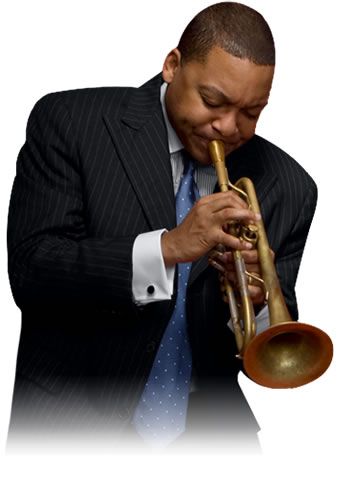
Good Sunday Morning POU!

If there is such a thing as a jazz statesman, Wynton Marsalis is the man. It’s hard to think of a living jazz musician and composer who has done more to keep jazz alive and extend its reach to audiences all over the world.

In a way, he was born to the role — a child of New Orleans, the birthplace of jazz, and one of six sons of jazz pianist, Ellis Marsalis, and the younger brother of saxophonist Branford Marsalis. By the age of eight, he was playing his trumpet in public. At 18, he went off to New York to study music at Julliard and was promptly recruited by the gifted drummer Art Blakey to join his band, the Jazz Messengers.
That was just the start of a phenomenal career in which Wynton has played with everyone from Dizzie Gillespie to Sarah Vaughn to Eric Clapton, won nine Grammys for both jazz and classical music, and founded the Jazz at Lincoln Center Orchestra, celebrating its 25th anniversary this year.
In the process, Wynton has become the public face of jazz — whether it’s tracing and defining the history of America’s quintessential music in the Ken Burns jazz series or espousing his philosophy of jazz in one of his five books, including “Moving to Higher Ground: How Jazz Can Change Your Life.” It’s a role and a responsibility he has assumed with pride and style, even when it has sometimes provoked criticism.
A short documentary on Wynton Marsalis and his music: Playing Through the Changes
“I’m a member of Afro-American culture and American culture,” he tells Sound Tracks reporter Alexis Bloom. “My father was a jazz musician. I have a unique look at the art form because I was raised in it and I am knowledgeable about it. The older musicians trusted in me, they taught me certain things, they treated me a certain way, really like I was their son or grandson. And they gave me certain knowledge and information with the understanding that I would represent it.”
And represent it, he has, constantly touring with his orchestra, traveling across the U.S. and to more than 30 countries, including a major tour in Cuba not long ago. Like his heroes before him, Louis Armstrong and Duke Ellington, he has become jazz’s goodwill ambassador.
Sound Tracks follows Marsalis and his Jazz at Lincoln Center Orchestra on the road as they perform in Chicago, spreading the gospel of jazz to young people. What kind of future does jazz, America’s music, have in today’s pop-saturated, commercial music scene? As many jazz clubs close and the audience ages, is jazz fading into the shadows?
In special concerts for kids and in workshops for young musicians, Marsalis and his “band of brothers” who have played with him for years — like clarinetist Victor Goines and drummer Ali Jackson — take time to pass along the music they love and the lessons they’ve learned about creativity and discipline.
Backstage, Wynton shows no signs of slowing down, “I grew up in this culture, I love representing it. All of this is an honor for me. I don’t care if I live to be 95 and I can just creep up on a bandstand and hit two or three notes, it’s going to be the same honor to play this music.”
